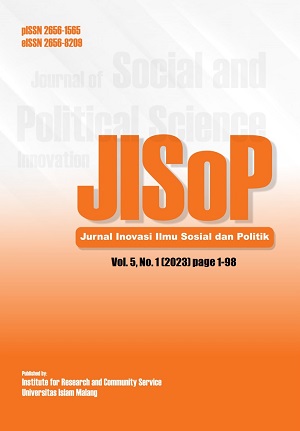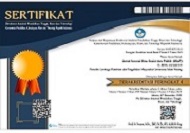Implementation of the business incubation program as an effort to accelerate the improvement of the quality of human resources in small and medium industries
DOI:
https://doi.org/10.33474/jisop.v5i1.19290Keywords:
human resources, business incubation, small and medium industryAbstract
This research was conducted with the aim of improving and strengthening the quality of existing Human Resources in developing Small and Medium Industries (IKM), namely in the batik industry in Jatipelem Village, Diwek District, Jombang Regency. This research uses a qualitative approach with a case study method. The main problems found in this study are the absence of special design characteristics for Jatipelem batik, a lack of understanding of the concept of organizational management, a lack of capital for SMEs, the role of batik associations is not optimal, and digital sales are not optimal. The results of the study show that training and mentoring programs are needed in order to improve the quality of existing human resources, which include batik product design training, organizational management training, Business Model Canvas (BMC) training, IKM financial training, and digital marketing training.
References
Bruneel, J., Ratinho, T., Clarysse, B., & Groen, A. (2012). Technovation The Evolution of Business Incubators : Comparing demand and supply of business incubation services across different incubator generations. Technovation, 32(2), 110–121. https://doi.org/10.1016/j.technovation.2011.11.003
Harris, R., McAdam, R., & Reid, R. (2016). The Effect of Business Improvement Methods on Innovation in Small and Medium-Sized Enterprises in Peripheral Regions. Regional Studies, 50(12), 2040–2054. https://doi.org/10.1080/00343404.2015.1083971
Haugh, H. (2020). Call the midwife! Business incubators as entrepreneurial enablers in developing economies. Entrepreneurship and Regional Development, 32(1–2), 156–175. https://doi.org/10.1080/08985626.2019.1640480
Karnani, A. (2007). The Mirage of Marketing to the Bottom of the Pyramid: How the Private Sector Can Help Alleviate Poverty. California Management Review, 49(4), 90–111. https://doi.org/10.2307/41166407
Lilai, X. (2009). Business incubation in China Effectiveness and perceived contributions to tenant enterprises. Management Research Review, 33(1), 90–99. https://doi.org/10.1108/01409171011011599
Lin, D., Wood, L. C., & Lu, Q. (2012). Improving business incubator service performance in China: the role of networking resources and capabilities. Service Industries Journal, 32(13), 2091–2114. https://doi.org/10.1080/02642069.2011.582498
Muhammad, M. Z., Char, A. K., Yasoa’, M. R. bin, & Hassan, Z. (2010). Small and Medium Enterprises (SMEs) Competing in the Global Business Environment : A Case of Malaysia. International Business Research, 3(1), 66–75. https://doi.org/10.5539/ibr.v3n1p66
Nasution, Z. (2014). Pertumbuhan Ekonomi dan Kemiskinan. Jurnal Ecobisma, 1(2), 1–10. https://doi.org/10.36987/ecobi.v1i2.20
Ogunyomi, P., & Bruning, N. S. (2016). Human resource management and organizational performance of small and medium enterprises (SMEs) in Nigeria. International Journal of Human Resource Management, 27(6), 612–634. https://doi.org/10.1080/09585192.2015.1033640
Onyeje, S. A., Court, T. O., & Agbaeze, E. K. (2022). National Enterprise Policy Dimensions and Sustainability of Micro, Small and Medium Enterprises (MSMEs). Journal of African Business, 23(2), 435–453. https://doi.org/10.1080/15228916.2020.1838838
Panggabean, R. (2005). Profil Inkubator dalam Penciptaan Wirausaha Baru.
Redondo-Carretero, M., & Camarero-Izquierdo, C. (2017). Relationships between Entrepreneurs in Business Incubators. An Exploratory Case Study. Journal of Business-to-Business Marketing, 24(1), 57–74. https://doi.org/10.1080/1051712X.2016.1275826
Rice, M. P., & Matthews, J. B. (1995). Growing New Ventures, Creating New Jobs: Principles and Practices of Successful Business Incubation (First Edit). Praeger.
Sentana, E., González, R., Gascó, J., & Llopis, J. (2017). The social profitability of business incubators: a measurement proposal. Entrepreneurship and Regional Development, 29(1–2), 116–136. https://doi.org/10.1080/08985626.2016.1255436
Silva, M. C. da, Rampasso, I. S., Anholon, R., Cooper Ordoñez, R. E., Quelhas, O. L. G., & Silva, D. da. (2018). Critical Success Factors of Brazilian Business Incubators. Latin American Business Review, 19(3–4), 197–217. https://doi.org/10.1080/10978526.2018.1534545
Soba, H. s, Hasbullah, R., & Nuryartono, N. (2018). Strategi Pengembangan Inkubator Bisnis sebagai Lembaga Pendampingan Perusahaan Pemula: Studi Kasus Inkubator Bisnis IPB. Jurnal Aplikasi Manajemen Dan Bisnis, 4(1), 96–105. https://doi.org/10.17358/jabm.4.1.96
Voisey, P., Gornall, L., Jones, P., & Thomas, B. (2006). The measurement of success in a business incubation project. Journal of Small Business and Enterprise Development, 13(3), 454–468. https://doi.org/10.1108/14626000610680307
Downloads
Published
How to Cite
Issue
Section
License
Copyright (c) 2023 Muhammad Faisal Riza, Irfan Kharisma Putra, Ahmad Bachtiar Arif, Rispa Ngindana

This work is licensed under a Creative Commons Attribution-ShareAlike 4.0 International License.
.



_-_Copy.jpg)





